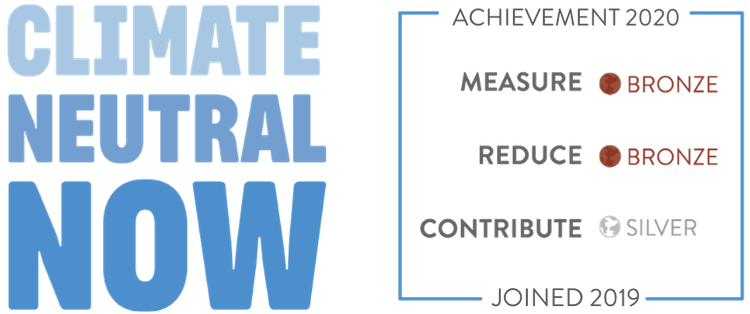
Human activities have been the major contributor to the increasing greenhouse gas (GHG) emissions. Global human-caused GHG emissions have increased since the pre-industrial era and are now higher than ever. Greenhouse gas emissions contribute to the global warming and changing climate patterns. Actions need to be taken on every level (globally, nationally, personally...) to reduce the emissions.
An accurate and comprehensive knowledge is needed on fossil fuel emissions and biomass burning in order to predict and mitigate to climate change. Moreover, it is essential to know their interaction with the global biogeochemical cycles, such as Earth's carbon cycle which is the natural circulation of carbon among the air, water and ecosystems – the three domains of ICOS. Knowledge on these allows nations and other parties to calculate their emissions and set up reduction targets accurately.
Our contribution to emission reduction
ICOS is committed to support climate action and emission reduction by producing high-quality and standardised greenhouse gas data in the atmosphere, the earth and oceans. This information is being used by scientists as well as by decision makers in reducing emissions in Europe and globally. Here are some examples on how our work contributes to the global emissions reduction targets:
We offer relevant data to make Paris Agreement possible
The Paris Agreement aims to strengthen the global response to the threat of climate change by keeping a global temperature rise this century well below 2 degrees Celsius above pre-industrial levels, as well as to pursue efforts to limit the temperature increase even further to 1.5 degrees Celsius.
The knowledge generated by the use of our data supports efforts to comply with the Paris Agreement resolutions. ICOS responds to the international goal by establishing global standards for observations as well as open, accessible, and interoperable data in order to ensure optimal services for societies in their efforts to mitigate climate change.
We are also an Observer Intergovernmental Organization (IGO) to the United Nations Framework Convention on Climate Change (UNFCCC), which aims to reach global consensus on actions to mitigate and to adapt to climate change as outlined in the Paris Agreement.
We work towards separating natural & human-caused emissions
Cities require specific attention since they continue to grow and their role in climate change is increasing. Currently, a major scientific challenge is how to observe and estimate the carbon dioxide emissions from urban areas. ICOS is developing new technologies to estimate the human-caused emissions to comprehensively analyse urban emissions. This is done through so called radiocarbon measurements, in which ICOS will have an important role in the future.
We support the development of climate-smart cities
Urban measurements of greenhouse gas emissions and sinks are important for the society and decision makers. ICOS aims to pave the way towards city observatories that directly support the development of climate-smart cities. We will further develop relevant methods for urban greenhouse gas measurement approaches, which are already applied as prototypes. We also provide support and access to scientists and projects which aim to further develop and integrate technologies to detect urban greenhouse gases.
Our ground-based measurements complement satellite observations
The connection to satellite observations is another important way ICOS is contributing to the reduction of emissions. Combining carbon dioxide (CO2) observations from the space with our ground-based measurements opens the door for a comprehensive system of observations.
We are becoming climate neutral
ICOS ERIC (European Research Infrastructure Consortium), the coordinating body of ICOS research infrastructure, has joined the United Nations Climate Neutral Now initiative in January 2019 to further help to implement the Paris Agreement.
Since then, ICOS ERIC has committed to measure its emissions related to business travels and home-work-home commuting of the ICOS ERIC personnel, reduce as much emissions through its own action as possible, as well as to compensate any remaining greenhouse gas emissions by offsetting them.
ICOS ERIC’s business travel and commuting emissions per year
| Year | CO2 equivalent emissions in total | CO2 equivalent emissions per personnel |
| 2020 | 8,3 tons | 0,460 tons |
| 2019 | 106 tons |
6,225 tons
|

Short overview to ICOS ERIC's emissions and compensation per year
Emissions & compensation in 2020
The coronavirus disease 2019 (COVID-19) pandemic had a profound effect on the local and global travelling, decreasing the ICOS ERIC's emissions drastically for 2020.
To compensate its emissions for 2020, ICOS ERIC has paid a voluntary cancellation of carbon offsets by donating 154 US dollars to the project in India which distributes solar water heaters.
Emissions & compensation in 2019
In 2019, business travel was the largest contributor to ICOS ERIC’s carbon footprint, accounting for 98 % of emissions.
ICOS ERIC personnel formed a cycling team together with two other research organisations located at the Kumpula Campus to join a cycling competition (“Kilometrikisa” 1.5.–22.9.2019), to encourage bicycle commuting and everyday cycling. The cycling team saved 1,24 tons of CO2 by cycling 7090 km in total.
To compensate its emissions for 2019, ICOS ERIC paid a voluntary cancellation of carbon offsets by donating 1590 US dollars to the project in Uganda which improves cook stoves for schools and institutes. The project was considered important, since ICOS supported EU-African cooperation for food security and greenhouse gas observations through the SEACRIFOG project (2017–2020).